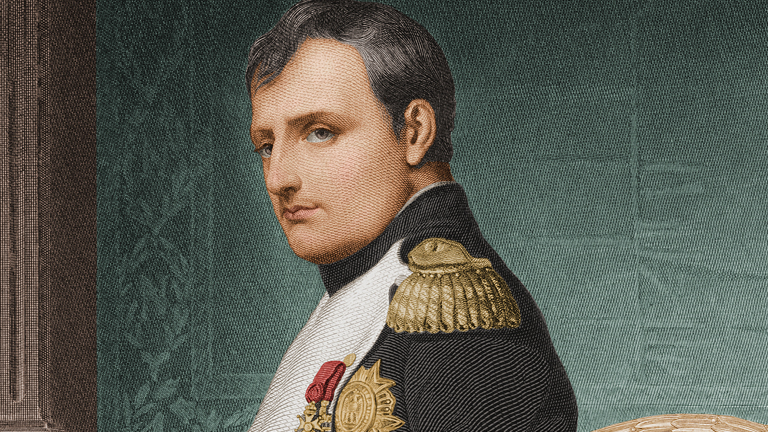 |
| A very dramatic picture of Napoleon http://www.biography.com/people/napoleon-9420291 |
Whenever I hear the name Napoleon, I think of Napoleon Dynamite; just kidding I think of the Bonaparte one, like we're supposed to. Napoleon was probably well known for his "dictatorship" over a large span of Europe around the late 1700s to the early 1800s. Almost eighty percent of Europe was directly or indirectly under his control. I've always been taught that Napoleon was a mean, short yet intimidating man who decided to take control of the whole world. But in class, we learned that there were many who had mixed feelings for him. We read a few articles on the different opinions on Napoleon's rule, which I personally found really interesting. We looked at short articles/excerpts by Madame de Stael and Marshal Michel Ney, and an essay by Thomas J. Vance. Madame de Stael was generally opposed to Napoleon's impact on society, while Marshal Michel Ney, an army general favored Napoleon's rule. Thomas J. Vance authored an essay mentioning the various opinions of historians on Napoleon's impact on the world.
Madame de Stael states in her mini excerpt that Bonaparte's government was based on his "profound contempt for all the intellectual riches of human nature: virtue, dignity, religion, enthusiasm." Apparently, Napoleon regarded these 'intellectual riches' as "the eternal enemies of the continent." Stael thought that Napoleon's reign was basically a universal monarchy. Stael was predicted to be part of the nobility, who were strongly opposed to Napoleon's decisions that helped the poor. In her final argument she says, "His [Napoleon's] system was to encroach [intrude] daily upon France's liberty and Europe's independence...By altering between cunning and force he has subjugated [conquered] Europe."
Contradicting Stael's words, army general Marshal Michel Ney praises Napoleon's rule, in which "the times are gone when the the people were governed by suppressing their rights." He claims that "liberty triumphs in the end", with their "august emperor", Bonaparte. Ney as part of the army, obviously, benefited from Napoleon's military dictatorship, and preferred his rule.
Thomas J. Vance's essay titled The Lost Voices of Napoleonic Historians, nicely incorporates both the negative and positive thoughts on Napoleon's rule. Many viewed Bonaparte as a creative and intelligent military general, who would have brought good fame to his name if he hadn't become filled with excessive pride and greed-"...[he] would have been "regarded in the light of something heroic, and remembered...perhaps dangerously, fine...A great soldier, a great liberator, a great reformer and a great lawgiver....it was given to him to live for 18 years after this, and to work actively for 12...it must be confessed...as a usurper, a tyrant, and a greedy, egotistical and ambitious ruler..." Vance then lists Napoleon's great characteristics that were often unrecognized, summing them up by saying "He was the greatest genius of his time...perhaps of all time...that high wisdom born of reflection and introspection which knows its own powers and limitations..." Vance's work allows us to analyze Bonaparte's impact on most of the world from all perspectives.
Overall, Napoleon's rule altered the social, economical, and political systems of Europe. He balanced France's budget by establishing the Bank of France. Also, in order to restore economic prosperity, he controlled prices, encouraged new industry, and undertook massive public works programs. However, he stole a great deal of money, wealth, and art from Italy. The political power of the Roman Catholic Church was significantly reduced, as well. All the countries he conquered had to follow his Napoleonic code, which included rules such as:
- Freedom of religion
- Eliminate birth rights
- Introduced the meritocracy system
- Only provide government jobs to those who qualify
On a social standpoint, meritocracy was introduced, and it cleared all social titles. This change benefited the once poor and modern classes, naturally angering the nobility. Serfdom was eventually abolished, allowing more citizens to have rights to property, education, and qualified jobs.
Napoleon Bonaparte is still recognized and praised for his exceptional intellect and strong ambition. His rule changed society, and perhaps the world, for both the better, and the worse; as we learn that Napoleon was viewed from different standpoints, we realize the once all-mighty ruler had his drawbacks, as well. His unique ideas helped him rise to the top, conquering almost the whole of Europe, making him one of the most extraordinary military leaders, and dictators, of all time (sadly, unlike Napoleon Dynamite).
Just a heads up, the video is really really short (only 60 seconds) with tons of information
No comments:
Post a Comment